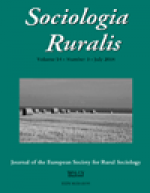RHN 94/2014 | Publication
Virtual Issue: Family Farming (= free accessible at Wiley Online Library)
Edited by Bettina Bock
Published: 7 August 2014
The United Nationals declared 2014 as the International Year of Family Farming to highlight the importance of family farms and smallholders farmers. Throughout the world family farms constitute the majority of all farms, which underlines their importance for food security. FAO promotes the year of family farming as follows: “Family Farmers: feeding the world, caring for the earth” (www.fao.org). In Rural Sociology family farming has always been an important subject of research and many publications in Sociologia Ruralis deal in some way or other with family farming. This virtual issue gathers a selection of publications on family farming in Sociologia Ruralis between 1969 and 2013. Taken together they reflect the development of thought through continuously returning questions (survival, succession, gender) as well as shifting points of attention. Evident is also that the interest in family farming as such somewhat decreased after the 90s. In brief, we can see that the initial debate on family farms’ persistence during capitalism and modernization in Europe and the global North more generally, has given way for discussions on the definition and particular characteristics of family farming, the role of women, part-time farming as a survival strategy, the renascence of family farming in Central and Eastern Europe, the importance of (multifunctional) family farms for rural development and the turn towards sustainable, high quality food production. Finally, we recently witness a returning interest in family farm succession (see also early view).
Articles:
Social implications of farm mechanization, a final report on cross national research by Anton J. Jansen
Patriarchy and Property by Harriet Friedman
Family Goals and Survival Strategies by David Symes and John Appleton
The Persistence of Family Farms in United States Agriculture by Nola Reinhardt and Peggy Bartlett
Farm Families Between Tradition and Modernity by Karl Friedrich Bohler and Bruno Hildenbrand
Ageing and Succession of Family Fams: The Impact on Decision-making and Land Use by Clive Potter and Matt Lobley
Power Analysis and Farm Wives by Sally Shortall
Defining and Operationalizing Family Farming from a Sociological Perspective by Göran Djurfeldt
Family Farming and Capitalist Development in Greek Agriculture: A Critical Review of the Literature by Charalambos Kasimis and Apostolos G. Papadopoulos
Pluriactivity as a Livelihood Strategy in Irish Farm Households and its Role in Rural Development by Jim Kinsella, Susan Wilson, Floor De Jong and Henk Renting
Gender Identity in European Family Farming: A Literature Review by Berit Brandth
‘Good Farmers’ as Reflexive Producers: an Examination of Family Organic Farmers in the US Midwest by Paul Stock
Subsistence and Sustainability in Post-industrial Europe: The Politics of Small-scale Farming in Europeanising Lithuania by Diana Mincyte
Peasantry and Entrepreneurship As Frames for Farming: Reflections on Farmers’ Values and Agricultural Policy Discourses by Miira Niska, Hannu T. Vesala and Kari Mikko Vesala
Resourcing Children in a Changing Rural Context: Fathering and Farm Succession in Two Generations of Farmers by Berit Brandth and Grete Overrein
Source: onlinelibrary.wiley.com
